Kingdom of Falcar
The Kingdom of Falcar | |
|---|---|
| Motto: Normresànus Falkarnu Our Formal Monarchy of Falcar (rough) | |
| Anthem: The National Anthem of Falcar (The Evening Hymn) | |
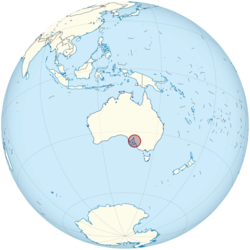   | |
| Capital | Sunin, Arbonia |
| Largest city | Port Maronia, Maronia |
| Official languages | Australian English, Falcarian |
| Demonym(s) | Falcarian |
| Government | Elective Monarchy Centre-left Isolationist State Capitalism[1] |
• Emperor | Todd Leon |
• Provisional Prime Minister | The Emperor |
| Henry Rudd | |
| Legislature | First Blue Council Decree |
| Establishment | 28 December 2008 as Jennings 1 January 2015 as Falcar |
| Population | |
• Including non-active residents census | 17 |
| Currency | AUD (defined by the The National Bank) |
| Time zone | +9:30 GMT |
The Kingdom of Falcar (Falcarian: Normresànus Falkarnu, pronounced: [nɔːm'ɹesɒn'ʌs fæl'kɑrnu]; or (/fæl'kɑrnu/; Falkarnu) is a micronation founded on New Years Day 2015 by the signing of the Royal Foundation Act. It succeeded the former micronation of Turto, founded in 2009.
The Kingdom is a 3.2 level micronation as defined by Linden's Revised System of Classification, ranking as a significant micronation.[2]
The Kingdom of Falcar consists of the townships of Hawkepool, Port Maronia and the capital Arbonia, Jennsia, Maronia and formally Kanin and The Kanes.
As a state capitalist nation, Falcars primary intended purpose is to produce revenue through monopolised, state-owned (or, "crown") corporations, and to use the revenue generated through exports to provide services, pay wages, and give benefits to its citizens.
History
The Area which now comprises Falcar were occupied by the traditional Kaurna and Nharangga people for thousands of years prior to the arrival of Europeans in the territories. In 1836, settlers landed in Adelaide and started what would later become the colonisation of South Australia. In 1901, South Australia joined other states and became part of the Commonwealth of Australia. In the late 1980's the territories of Jennsia were purchased from that government, followed by the territory of Maronia in the 2000's and Arbonia in the 2010's.
In December 2008 a small patch of land named Jennings was declared independent from Australia. Jennings produced currency and had basic legislative frameworks and a university. The following year saw the founding of a successor micronation based on a shared desire to found a country between the founder of Jennings and others at his high school. The People's Republic of Turto was founded shortly thereafter.

 The first flag of Turto was official for less than a month in 2010 and used a ratio of 1:2 rather than the later 2:3 Turtonian/Falcarian standard
The first flag of Turto was official for less than a month in 2010 and used a ratio of 1:2 rather than the later 2:3 Turtonian/Falcarian standardTurto survived through various forms over the next few years, including a political shift towards monarchy with the Turtonian Empire and a simplification of structure through the Kingdom of Turto. It held significant political relations with the Federated Republics of A1 and it's predecessor the Most Glorious People's Republic of A1, as well as Dranoria, Rukora, and others.
By 2014 it was becoming apparent that the micronation was in serious need of reform. Many positions in Parliament were unfilled and the ability to conduct government was becoming difficult. In December The King of Turto passed the Royal Foundation Act, abolishing the Second Turtonian Kingdom and succeeding it with the Kingdom of Falcar.
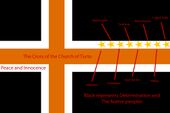
 The last official flag of Turto, The Turtonian Cross was used from 2012 until the establishment of Falcar in 2015 and contained a variety of meanings
The last official flag of Turto, The Turtonian Cross was used from 2012 until the establishment of Falcar in 2015 and contained a variety of meaningsOn January 1st 2015 the Royal Foundation Act came into effect, whereby the King of Turto became the King of Falcar and assumed the role of Prime Minister as incumbent until an election is held. The Kingdom of Falcar consisted originally of Jennsia , Maronia (The former states of Turto), and The Kanes and Kanin.
In 2017 the territories formerly consisting of The Kanes and Kanin were relinquished with approval from the King back to Australia. Later that year the territory of Arbonia became the official Capital of Falcar. The Swan Act came into force, creating a criminal and civil court, regulating punishments for convicted persons and ensuring protections for accused people.
From 2020 until early 2022 the COVID-19 pandemic has caused the micronation to follow macronational law and close all borders between territories for brief periods of time, including to citizens with residency. The ability to conduct government was impacted and the nation went into a brief period of inactivity with only minor law reforms being passed. It was officially declared reactive in March of 2022 with constitutional amendments relinquishing arbitrary land claims.
In early 2023 some states such as Maronia were retitled and a policy of temporary micronational isolationism was officially adopted to allow for reform. Later that year, the role of succession was changed from primogeniture to Elective

Government and politics
Also see Acts of Government in Falcar
Economic System
The Falcarian market system is not defined within the constitution, although it could be simply described as state capitalist as all the corporations and organisations are directly controlled by the government. It may be possible for persons who wishes to found a corporation to do so and possibly work within a free market system, although no such application has ever been submitted to the government (as of 2018) and remains untested.
Political System
The Monarch acts as Head of State and Head of Government until such time as a prime minister is appointed, at which point the role of Head of Government is invested in the Prime Minister on behalf of the Monarch.
The Falcarian Constitution requires the establishment of a representative house in the event of the formation of a political party.
The Monarch of Australia, currently Charles III may ascend to the crown of Falcar at any time per request.
Defense and Security

The Falcarian Defense Force is responsible for matters regarding national security and cyber security, whilst the Court system of Falcar (As defined by the Swan Act) is responsible for investigating, apprehending and convicting persons suspected of committing a crime against the nation, due to this Falcar does not have a police service, all prosecuting services are undertaken by the courts.
Ministerial Positions
Heads of each department are known as '(x)-General', for example, the 'Defence-General' is constitutionally the 'Monarch', while the 'Foreign-General' is the head of Foreign Affairs.
Foreign relations
The Nation of Falcar is open to diplomatic relations with other micronations globally. At present mutual recognition and/or peace agreements have been ratified with the Empire of Iustus and the Gymnasium State.
Automatic recognition within Falcar
Any micronation which has received contact from the Falcarian Government at a diplomatic level is recognised as a macronational state, although this does not guarantee recognition of land claim.
Micronational Classification
Various micronations and groups have attempted to classify a number of factors to assist them in international diplomacy, many of these classifications have broad or undefined categories which makes them unable to correctly define a nation, for example one ranking may assume financial interests are dominant, while another may find cultural influence more important. the following is a list of classifications and the Falcarian result; note that inaccuracies may exist as the information is based on the 2017 census and questionnaires are not always easily defined.
| System of Classification | Classification | notes |
|---|---|---|
| Boodlesmythe-Tallini | 5th World | Bricks and Mortar, Small, Statehood |
| Dresner's System | 3.2 common micronation |
Pop: 2, Culture 5, Allies 3, Influence 3, Budget 3 |
| Freayth's System | 5 influential and advanced micronation |
Politics 3, Development 2, Budget 2, Culture 3, Freedom 3, Influence 2 |
| Generalized Nation Score | 1.03 | |
| Linden's Revised System | 3.2 average development |
|
| Matthew's Democracy | 3.25 Fair democracy, needing improvement |
Party 0, speech 4, leader 4, minorities 4 |
| Skywalker's Composite System | 5.83 | |
| Universal Nation Classification | Semi-Recognised Nation | lacks recognition by majority of Recognised nations |
National holidays
National Holidays in Falcar are decided by the Monarch or one of his representatives on behalf of the Monarch;
On the 23rd of January 2018 the monarch officially renounced the holiday relating to the settlement of the Australian continent by European Settlers, Colonialism Day, and announced the foundation of Eureka Day on the 3rd of December.
| Date | Holiday | Note |
|---|---|---|
| 1 January | Beginning of New Year | |
| 1 May | Mayday | Day in recognition of workers rights |
| 15 August | Falcarian National Day | Commemoration of the Falcarian Nation |
| 1 October | Emperor Birthday | Anniversary of the birthday of the Monarch |
| 24–26 December | Christmas | Religious celebration, officially recognised as cultural celebration |
| 28 December | Foundation Day | Signing the Constitution of Jennings, the Predecessor of Falcar |
| 31 December | New Year's Eve | Celebrates the end of the year |
Former Holidays
| Date | Holiday | Note | Removal |
|---|---|---|---|
| 26 January | Colonialism Day | Marking of the mass immigation of non-natives from Europe to Australia | Dismissed as a holiday preceding event in 2018 |
| 3 December | Eureka Day | Celebration of the Eureka Rebellion of 1854 | Replaced with Foundation Day on the 28 December, dismissed 31 May 2018 |
Languages
Falcarians speak Australian English, although the language Falcarian is increasing in written usage as the language has been developed and given legal recognition through the Linguistic Act 2016. As of early 2017, legislature is still required to be written in English and no legal proceeding has been conducted in the Constructed Falcarian language.
Citizenship
Falcarian Citizenship is regulated by the Department for Immigration and Citizenship, the Monarch also has the right to grant and revolke citizenship, along with the Falcarian Courts. Citizenship is open to all people who
- Do not reside in areas of political dispute, such as the Islamic State, Ukraine or Israel (as of 2016);
- Have never been convicted of a Macronational Major Crime, Including but not limited to Theft, Manslaughter or Sexual Offences;
- have never consecutively spent more that 5 years in prison, with the exception of discriminatory or unfair imprisonment;
- Have not been banished or have had citizenship revolked by a micronation recognised by the Falcarian State forcefully;
| Part of a series on |
| The Kingdom of Falcar |
|---|
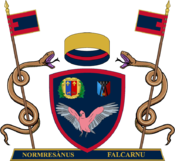 |
| As maintained by the Postmaster-General of Falcar |
Visitation
Visitation and Visa Requirements for entry into the Falcarian Lands are tightly controlled by the Department for Immigration and Citizenship, making entry into Falcar almost impossible.
Symbols of Falcar
On the 20th of May 2018 the monarch announced the creation of three shields to individualise the regions of Falcar, these symbols succeeded the national coat of arms as the standard arms to display in said region.
National Symbols
Coat of Arms and Heraldry
| Image | Region | Dates Active | Notes | Importance |
|---|---|---|---|---|

|
Full Arms of Falcar | 24 January 2018 – present | De jure Coat of Arms of Falcar decreed | National |
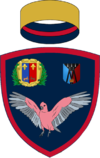
|
Short Arms of Falcar | 24 January 2018 – present | Shortened version of the Coat of Arms decreed | National |
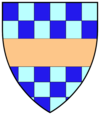
|
Maronia | 20 May 2018 – present | Shield Act 2018 | Territorial |
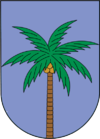
|
Arbonia | 20 May 2018 – present | Shield Act 2018 | Territorial |
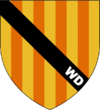
|
Jennsia | 20 May 2018 – present | Shield Act 2018 | Territorial |
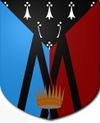
|
Coat of Arms of the Monarch acting as Prime Minister | 10 March 2017 – present | Only active during periods when the seat of Prime Minister of Falcar is occupied by the Monarch | Royal |
Flags
Current
-
 Flag of the Falcarian Navy
Flag of the Falcarian Navy
11 Mar 2017 - current -
 Flag of the Nation of Falcar during wartime, flag of the Falcarian Defence Force
Flag of the Nation of Falcar during wartime, flag of the Falcarian Defence Force
11 Mar 2017 - current -
 Flag of the Territory of Arbonia
Flag of the Territory of Arbonia
11 Mar 2017 - current -
 Flag of the Territory of Maronia
Flag of the Territory of Maronia
8 Apr 2012 - current -
 Former Flag of West Dianne, Flag of Jennsia and the Archhung of Turto.
Former Flag of West Dianne, Flag of Jennsia and the Archhung of Turto.
8 April 2012 - current -
 Flag of the City of Hawkepool
Flag of the City of Hawkepool
28 Aug 2011 - current
Former
-
Former National Flag of the People's Republic of Turto
28 November 2010 - 9 December 2010 -
Former National flag of the People's Republic of Turto during it's federated period.
9 December 2010 - 10 April 2011 -
Naval Jack
12 September 2011 - 1 January 2015 (Establishment of Falcar) -
National Civil Flag of Turto, The Turtonian Cross Flag.
5 April 2012 - 1 January 2015 (Establishment of Falcar) -
Flag of Angelopia, Drapgrad and the 2nd Division Army Turtonian Army
8 April 2012 - 1 January 2015 (Establishment of Falcar) -
Flag of Jakieland.
8 April 2012 - 1 January 2015 (Establishment of Falcar) -
Flag of East Dianne.
8 April 2012 - 1 January 2015 (Establishment of Falcar) -
Flag of Phillip, also Flag of the Robonia City.
8 April 2012 - 1 January 2015 (Establishment of Falcar)
References
- ↑ Royal Foundation Act (Falcar) Government Foundation Act 2014
- ↑ https://micronations.wiki/wiki/Classification_of_micronations#Level_calculation_3


































